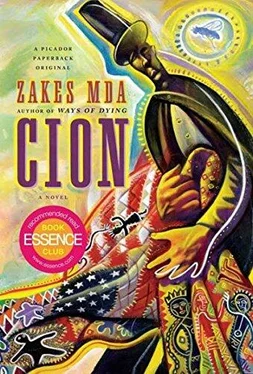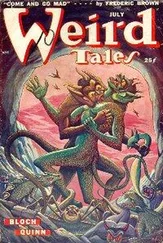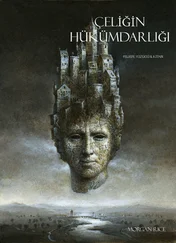“He ain’t no free black,” said Quigley. “He’s a slave. He won’t get far.”
“You’re the slave,” said The Owner. “I’ve got his manumission papers.”
He reached for the papers in the saddlebag.
“What’s your name, fella?” asked The Owner. When the slave hesitated he turned to Quigley and asked him the name of his former slave. It was only then that Quigley realized that he never really knew his slave’s name. He was just a slave. He should have given him a name. The saying goes that you can never exercise full power over anything until you name it. If he had named him he would not have betrayed him like this. He would have owned him totally. The property would have been in awe of the master.
The slave had no memory of a name that ever belonged to him. The Owner named him John Tyler after the President of the Union and signed the papers. He also wrote John Tyler next to the X the slave made on the receipt.
“You’ll never get away with this, you ninny,” screamed Quigley. “I am a white man born and bred. I can’t be a slave.”
“You ain’t no white man, you ain’t,” said The Owner. “You are a mulatto. You are a fugitive from my plantation and now I am taking you back.”
When the mulattos got mahogany chips from their saddlebags and boiled them in water on the very fire on which he had roasted his meat and then forcibly washed his face and hands with the concoction until he was brown, it became clear to him that The Owner had planned this whole thing even before he left his plantation. With the same fire The Owner heated an iron rod and the mulattos used it to curl the new slave’s hair to imitate the African kink.
The look of his erstwhile master as a brown man with nappy hair brought a burst of toothless laughter to the erstwhile slave. He emptied all the white powder into the Guyandotte, took the bundle of clothes and provisions that previously belonged to the master but were now obviously his and bade everyone goodbye.
“Fare thee well, Mr. President,” said The Owner, giving him a mock salute. The mulattos stood to attention and saluted as well. They watched him hobble away until he disappeared in the woods. Then they rode back to Fairfield Farms with their new slave securely tied with ropes.

The Fairfield Farms community marveled at the new lackadaisical slave, a mulatto who kept on insisting that he was a white man. There were stories that he had been purchased from Alabama, though he kept on insisting that he was tricked and sold by his own slave to Mr. Fairfield. How could a slave have a slave? It was obvious to all that he had delusions of grandeur. That was why he had cultivated a white man’s accent. And that was why he did not want to mix with other slaves.
From the time he arrived deep in the night and was chained to the wall in the guardroom, black slaves had made overtures of friendship toward him, as they always tried to assist the new arrivals to adapt to life at Fairfield Farms. They attempted to talk to him, but he sneered at them and faced the other way. Even when they brought him something to drink he gulped it grudgingly and did not even say thank you. When he was unchained after three days or so, and was assigned his duties, they continued to try to make him feel at home. They were rebuffed at every turn.
The community thought that as a mulatto he believed he was better than everyone else. Yet unlike other mulattos, who were a privileged lot, he worked with the black men in the fields. The community did not know why he was being treated so harshly. They did not understand why every week the man was forced by the faithful mulatto house slaves to take a secret bath in the guardroom, and why he hollered and cussed to the heavens every time he undertook these ablutions.
How could they believe his reason for smarting? After all, it was a known fact at the plantation that some of the slaves designated mulatto were in fact white. Even as The Owner registered them as his mulatto property after acquiring them, the authorities knew that they were white. Why would The Owner disguise the fact that the new slave was in fact white? Another thing: all the white slaves at Fairfield Farms were women, and were there for breeding mulatto children. What would The Owner be doing with a white male slave? If he was meant to mate with black women why was he never at the mating bays? The man must be delusional. He was clearly a mulatto. He just needed somebody to take him back to mother earth from the clouds on which he seemed to be floating.
Though the slave failed to convince the inhabitants of the plantation of his racial pedigree he knew that deep down under the brown dye of the mahogany chips he was a white man, as pure as The Owner himself. For many days after his capture he sank into a deep depression and stayed unwashed and stinking. Then he took to marching outside the big house singing Irish songs and demanding justice as an Irishman. The community was convinced that the new slave had gone raving mad. House slaves found this entertaining, especially when he took to calling The Owner names and demanded to see the lady of the house. They let him go on with his hollering for a while, especially when both targets of his invective were away. When everyone was tired of the entertainment the burly mulattos seized the slave, gave him a few whacks and then sent him to the guardhouse where they chained him to the walls.
Once the lady of the house came out to see what the commotion was about. Immediately the man saw her he threw himself at her feet and pleaded that she tell the truth. When the burly mulatto guards rushed forward to protect her she asked them to let the man speak. She was enjoying the mortification of the rogue who had exploited her naivety and almost cheated her of a fortune. The brown tone on his skin, the curly hair, the tattered calico pants and shirt, the black shoeless feet and the smudges of filth on his face arms and legs gave the lady of the house much satisfaction.
“You know me, you do,” said the slave. “I sold you the potion and I’m sorry about it. You’ve humiliated me enough with the brown paint. Please ask your man to set me free, madam. I’ve learned my lesson.”
But the lady of the house said she did not know what the lunatic was talking about. She denied ever setting eyes on him. She knew nothing about the potion either and did not understand the gibberish about brown paint. She ordered the guards to take him back to the guardhouse and chain him to the walls until he came to his senses. Only then could he return to the field to work with the other black men.
It was much better to be in the field than to be chained. Soon the slave calmed down and stopped his nonsense.
He seemed to get into the groove of things at the plantation and everyone thought he had accepted his lot like a man, though he kept to himself. Even the guards got careless and sometimes left his pen unlocked.
One day he took a chance and escaped. He told his story to white men he encountered outside the boundaries of Fairfield Farms. They did not believe him. Or they pretended not to believe him. Instead they brought him back to The Owner. He received a few lashes for that. Yet he tried again. But the slave chasers caught him before he could get far. He was, after all, ignorant of the art of flight and since he did not mix with the others, who he felt were naturally inferior, he did not learn anything about the message of the quilts and of the spirituals and about the slave stealers and all the lore surrounding freedom.
For a long time he steadfastly refused to socialize with other slaves. Until it became necessary to do so in order to get the hooch that the blacks covertly brewed or distilled. He realized that he had missed the communion of other men and women. For his survival he gradually developed the habits of Africans. By now he was no longer brown but white. The Owner and his minions had finally got tired of browning him with mahogany chips. They had humiliated him enough. But of course the change of color did not mean his situation had changed. The Owner still insisted that he was a mulatto and he was no different from the other white slaves who had been declared mulattos. To the Africans his white complexion did not matter anymore. What mattered was that he identified with Africans and therefore he was an African.
Читать дальше













